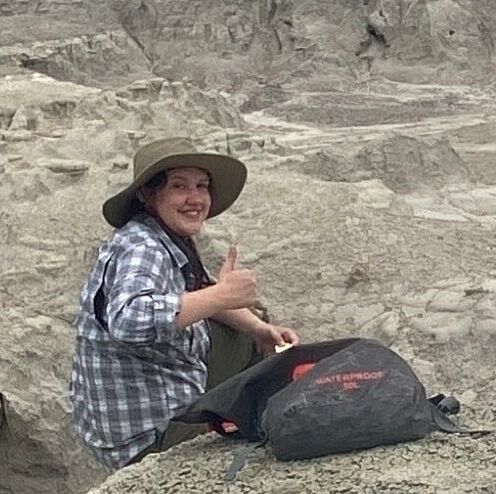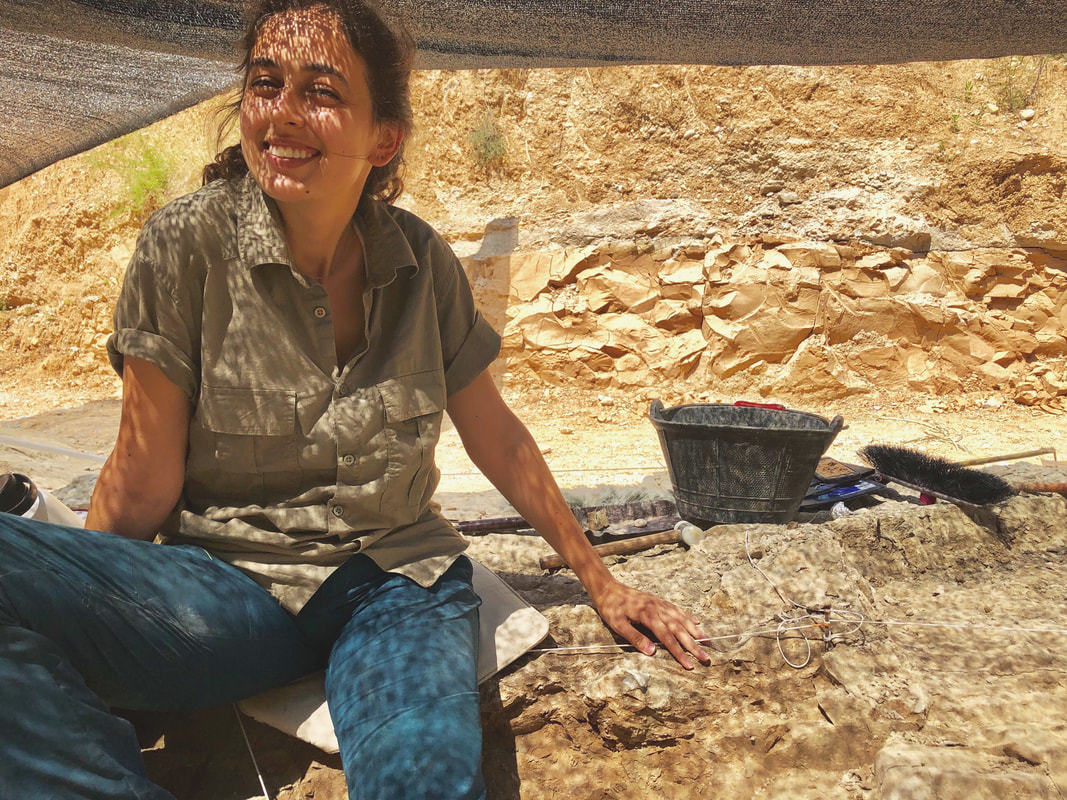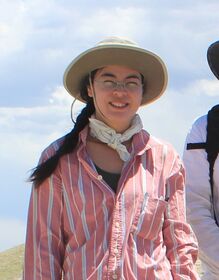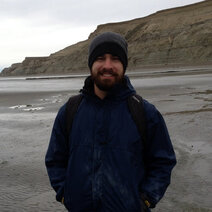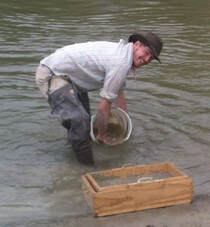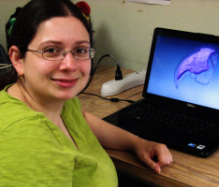*Students listed on this page include those for whom Boyer serves(d) as principle advisor and those for whom he is/was a dissertation committee member.
Current PhD Students
Julia Stone - Duke University (Evolutionary Anthropology)
|
Major Advisor: Doug Boyer
Julia Stone is a first year PhD student in the Boyer Lab interested in early primate evolution. She completed degrees with honors in Biochemistry and Anthropology at the University of Texas at Austin. While there, she worked with Dr. Liza Shapiro and Dr. Chris Kirk on an Honors Thesis looking at the effects of postcranial additions to phylogenetic character matrices. Her current research interests involve studying postcranial skeletal material of early primates, specifically the omomyid, Omomys. She is also interested in exploring faunal diversity during the Eocene in Asia and North America. |
Alisha Anaya - Duke University (Evolutionary Anthropology)
|
Major Advisor: Doug Boyer
Alisha is a third-year PhD candidate interested in the evolution of and transition to upright walking, with a special interest in shape evolution of the hands, feet, wrists, and ankles. Alisha completed her undergraduate degree at the George Washington University with a major in Biological Anthropology. There, she worked with Dr. Sergio Almécija on a project focused on the foot morphology of early hominins, such as Australopithecus afarensis, and what these morphologies can tell us about the development of lateral foot stiffness. This research resulted in a publication in the Journal of Human Evolution, and can be found here: www.sciencedirect.com/science/article/pii/S0047248421001305 Upon graduating, Alisha then went on to serve as the Laboratory Coordinator of the Biological Anthropology Lab at the American Museum of Natural History (AMNH). While at the AMNH, she worked with Drs. Ashley Hammond and Sergio Almécija to continue work on locomotor evolution and the transition to upright walking. A publication from this research can be found here: https://www.pnas.org/content/117/1/278.abstract Alisha's research interests currently include the evolution of limb dominance in mammals and associated morphological changes in the hands, feet, wrists, and ankles. Her research has expanded to include mammalian carnivores in addition to primates. In addition to her research, Alisha is highly involved in the department's DEI efforts as well as undergraduate mentorship. |
Madison Bradley-Cronkwright - Duke University (anthropology)
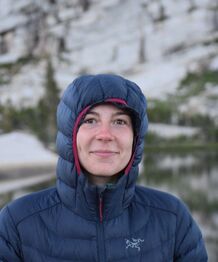
|
Major Advisor: Doug Boyer
Madison is entering the Boyer lab with a masters in Biological Anthropology from the University of Calgary. There, she worked with Dr. Campbell Rolian's selectively bred Longshanks mice to test the effects of hindlimb elongation on jumping performance and hindlimb muscle morphology. For this project she was awarded the American Association of Physical Anthropology's Mildred Trotter Prize at the 2017 annual meeting, and the sole masters-level nomination from the Department of Anthropology and Archeology for the University of Calgary's Governor General's Gold Medal and Chancellor's Graduate Medal. Through her co-supervisor, Dr. Susanne Cote, she was also exposed to work involving the morphology of fossil and extant material. While at the University of Calgary, she also worked in collaboration with members of the Icelandic Institute for Natural History (Náttúrufræðistofnun Íslands), the Arctic Fox Center (Melrakkasetur) in Iceland's Westfjords, and Denmark's Aarhus University to investigate whether pollutant exposure has a detectable effect on mandibular geometry in arctic foxes. This work is ongoing with one publication so far. While her research background is varied, it's based on an interest in evolutionary biomechanics, functional morphology, and how these two disciplines overlap. In the Boyer lab, she plans to continue looking into evolutionary and functional questions about primate origins, primate synapomorphies, and the so-called original primate condition. |
Former PhD Students
Brenen Wynd - Virginia Tech (geology)

|
Major Advisor: Sterling Nesbitt
Brenen is interested in the diversification of vertebrates in response to mass extinction events. He asks questions regarding the geographic and temporal distribution of extinct animals, as well as how their representative communities change and evolve. To explore these questions, he utilizes vertebrate microfossils as a study system. See his personal professional website for the latest updates: https://bmwynd.wixsite.com/bmwynd |
Sharon Doyle - Stony Brook University (anthropology)
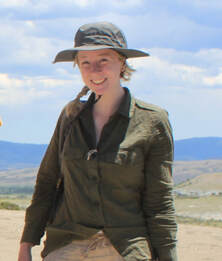
|
Major Advisor: James B. Rossie
Sharon is studying primate macroevolutionary dynamics and biogeography. |
Arianna Harrington - Duke University (anthropology)
|
Major Advisor: Doug Boyer
Graduation date: July 2020 Dissertation title: Encephalic Arterial Canals and their Functional Significance Arianna came to Duke from University of Florida Gainesville in Fall 2015. At UF she cultivated a love of fossils and primate brain endocasts. She published her honors thesis on endocasts of Eocene adapiforms in 2016 in the Journal of Human Evolution. Her dissertation focused on modeling brain metabolism from osteological foramina for encephalic arteries and inferred correlations between blood flow rate to the brain and metabolic energy consumption by the brain. In August 2020 she began a teaching position at Dixie State University in St. George Utah. |
Bernadette Perchalski - Duke University (anthropology)
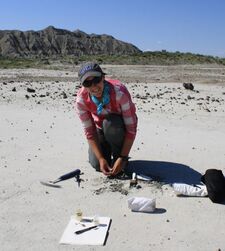
|
Major Advisor: Doug Boyer
Graduation date: July 2019 Dissertation title: Descending Locomotion in Primates Bernadette Perchalski conducts experimental research on primate arboreal locomotion, and is interested in linking behavioral differences to anatomy and support use in a comparative context. This information can then be used to reconstruct more complete pictures of behavior in extinct animals. Her dissertation research was conducted at the Duke Lemur Center and focused on how different primates adjust their movement in response to increasingly steep supports. She came to Duke from Penn State where she studied trabecular bone remodeling in small arboreal primates and in humans, and will be going on to work at the University of Arizona College of Medicine (Phoenix, AZ) as an anatomy teaching postdoc. Her latest research can be found at bernperchalski.wordpress.com. |
Ethan Fulwood - Duke University (anthropology)
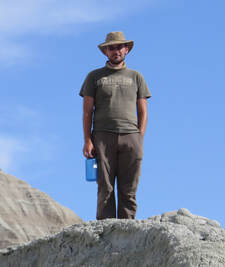
|
Major Advisor: Doug Boyer
Graduation date: July 2019 Dissertation title: Lemur Teeth in Three Keys: Dietary Adaptation, Ecospace Occupation, and Macroevolutionary Dynamics. Ethan Fulwood is interested in applying quantitative methods for capturing morphology to understand patterns of diversification in mammals. His dissertation focused on dietary evolution in lemurs, using tooth shape metrics to capture dietary adaptation and macroevolutionary modelling approaches to study the evolution of tooth shape across time. He came to Duke University from the University of Tennessee where he studied anthropology and evolutionary biology. He is beginning a position as a postdoctoral research associate at Washington University in St. Louis School of Medicine. His personal professional webpage is at http://www.ethanfulwood.com. |
Shan Shan - Duke University (mathematics)

|
Major Advisor: Ingrid Daubechies
Graduation date: July 2019 Dissertation title: Probabilistic Models on Fibre Bundles Shan Shan studies methods for diffusion-based approaches to feature mapping between images. She developed approaches to testing evolutionary models on collections of shapes united by a phylogenetic tree using lemur teeth as a test case. She is beginning a postdoc jointly sponsored by NSF and the Simons Foundation to continue investigating geometric mathematical and statistical evolutionary morphology. |
Addison Kemp - University of Texas, Austin (anthropology)
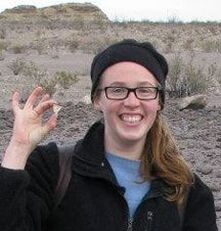
|
Major Advisor: E. Christopher Kirk
Graduation Date: April 2019 Dissertation title: The ecomorphology and function of binocular vision: Testing the predictions of Primate Origins Hypotheses Addison is interested in the ecological and adaptive drivers of primate origins. For her dissertation she studied how binocular vision aided leaping performance and insect predation by Cheirogaleus. This fall she will start as a postdoc in Prof. Daniel Schmitt's lab and will be teaching Gross Anatomy for Duke's School of Medicine. A link to her professional webpage is forthcoming. |
Rachel Roston - Duke University (biology)
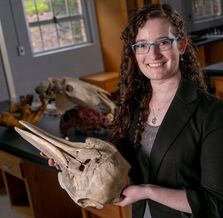
|
Major Advisor: V. Louise Roth
Graduation date: March 2019 Dissertation title: Evolution, Development, and Morphology of Cetacean Skull Novelties Rachel is interested in evolution and development of novel morphologies. For her dissertation she studied the morphologies, development mechanisms, and histological expression of 'telescoping' in the cetacean skulls and is now a postdoc with Sue Herring and Kathy Rafferty at University of Washington School of Dentistry. Find her on twitter:@rachelroston and google scholar: https://scholar.google.com/citations?user=3CinS5sAAAAJ&hl=en |
Randi Griffin - Duke University (anthropology)

|
Major Advisor: Charles L. Nunn
Graduation date: March 2018 Dissertation title: Adaptation and integration in primate skull shape evolution: combining geometric morphometrics and phylogenetic comparative methods Randi collected a geometric morphometric landmark dataset on full primate skulls with a sampling strategy that gave comprehensive diversity across primates. Her study is the only one to include landmarks delimiting a full skull as opposed to an isolated jaw or cranium. Analyzing the variance in landmark coordinates using cutting edge phylogenetic comparative methods, she found that sexually dimorphic primates had experienced higher evolvability and that an elevated mandibular condyle was correlated with folivory. She currently works as a data analyst for Kayak.com. See her blog to find out what she's up to: http://www.randigriffin.com/blog.html |
Jackson Spradley - Duke University (anthropology)
|
Major Advisor: Richard F. Kay
Graduation date: July 2017 Dissertation title: Small mammals as a proxy for paleoclimate reconstruction: Richness, Diversity, and Ecomorphology Dr. Spradley was a lecturer at University of North Carolina, Wilmington in the department of Biology and Marine Biology before moving to North Carolina State University in the Department of Veterinary Medicine. Jackson's research interests involve the paleoecology of extinct mammalian taxa as well as the evolution of mammalian communities in the context of changing climates and environments. Specifically, his research focuses on the biogeography of the South American continent, and in particular three mammalian taxa: Primates, Rodentia, and Metatheria. His professional profile is here: https://cvm.ncsu.edu/directory/spradley-jackson/ |
Gabriel Yapuncich - Duke University (anthropology)
|
Major Advisor: Doug Boyer
Graduation date: March 2017 Dissertation title: Body mass prediction from dental and postcranial measurements in primates and their nearest relatives Gabe is interested in the phylogenetic and adaptive context of euarchontan origins. His dissertation focused on improving theoretical and empirical understandings of body mass estimation in fossils. He served a postdoc with Chris Walker of NCSU and then as an instructor for Human Gross Anatomy in Duke's School of Medicine. See his personal webpage for current news! |
Julia Winchester - Stony Brook University (anthropology)
|
Major Advisor: Jukka Jernvall
Graduation date: May 2016 Dissertation title: Molar Topographic Shape as a System for Inferring Diet and Developmental Patterning in Cercopithecoid Evolution Julie is interested in tooth form and function. She is also interested in the development of comparative methods that focus on "homology-free" shape properties (e.g., Bunn et al. 2011). For her dissertation she tested effects of combining digital datasets creating using different scanning modalities by different labs in comparative morphological analyses to help establish more reliable production protocols and more pragmatic quality standards for digital data. Additionally she created MorphoTester, a user friendly computer software interface for analysis of digital data. Finally, she expanded the taxonomic sample of extant and extinct animals that have been analyzed with dental topographic variables, putting an emphasis on anthropoids and cercopithecoids. Currently, Julie is the lead developer and product manager of MorphoSource.org. She essentially co-directs this initiative with Boyer. |
Stephanie Maiolino - Stony Brook University (anthropology)
|
Major Advisor: William Jungers
Graduation date: May 2015 Dissertation title: Comparative and functional morphology of primate ungulae and distal phalanges Stephanie is interested in early primate evolution and origins. Using a variety of methods, her dissertation research explores the functional and phylogenetic significance of distal phalanx diversity in fossil groups such as adapiforms and omomyoids. This work particularly focuses on the origins of primate nails and grooming claws and what they can reveal about the emergence and relationships of major lineages. She has quantitatively documented the presence of grooming claws in some living platyrrhines (Maiolino et al. 2011) and in the fossil adapiform, Notharctus. Her ongoing work intends to shed light on the polarities and origins of this enigmatic feature among different primate groups. She obtained positions teaching anatomy after graduation. See her personal webpage for current affiliations and research. |
Mike Rosario - Duke University (biology)
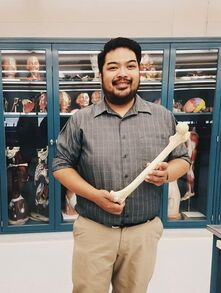
|
Major Advisor: Sheila Patek
Graduation date: March 2014 Dissertation title: Ballistic jumps of trap-jaw ants and computational methods for image analysis Dr. Michael Rosario is an Assistant Professor at West Chester University of Pennsylvania. His lab studies the elastic properties of biological structures and how elasticity affects organismal movement. By testing and developing computational models of the springs of mantis shrimp, grasshoppers, bullfrogs, and rodents, the Rosario lab looks across the tree of life to understand the functional roles of elastic energy within biological systems. For the latest on what he is up to see his personal lab website here: http://rosariolab.com |
Stephen Chester - Yale University (anthropology)
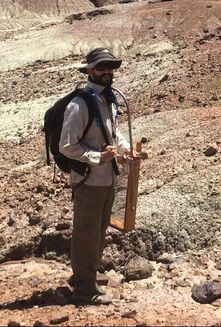
|
Major Advisor: Eric J. Sargis
Graduation date: October 2013 Dissertation title: Origin and Early Evolutionary History of Primates: Systematics and Paleobiology of Primitive Plesiadapiforms Stephen Chester is a paleontologist who specializes in the origin and early evolutionary history of primates and other mammals. He is an Assistant Professor of Anthropology at Brooklyn College and The Graduate Center, City University of New York, a Core Faculty Member in the New York Consortium in Evolutionary Primatology (NYCEP), and serves as an Associate Editor for the Journal of Human Evolution. Stephen is affiliated with and builds fossil collections for the American Museum of Natural History, the Denver Museum of Nature and Science, the Florida Museum of Natural History, and the Yale Peabody Museum of Natural History. His lab website is here: http://stephenchesterpaleontology.com |
Jesus Puente - Princeton University (mathematics)

|
Major Advisor: Ingrid Daubechies
Graduation date: August 2013 Dissertation title: Distances and algorithms to compare sets of shapes for automated biological morphometrics Jesus Puente developed the rationale and protocol for 'auto3dgm' and automated 3D morphometrics tool for automated comparisons of homologous bones from species with disparate morphologies. |
